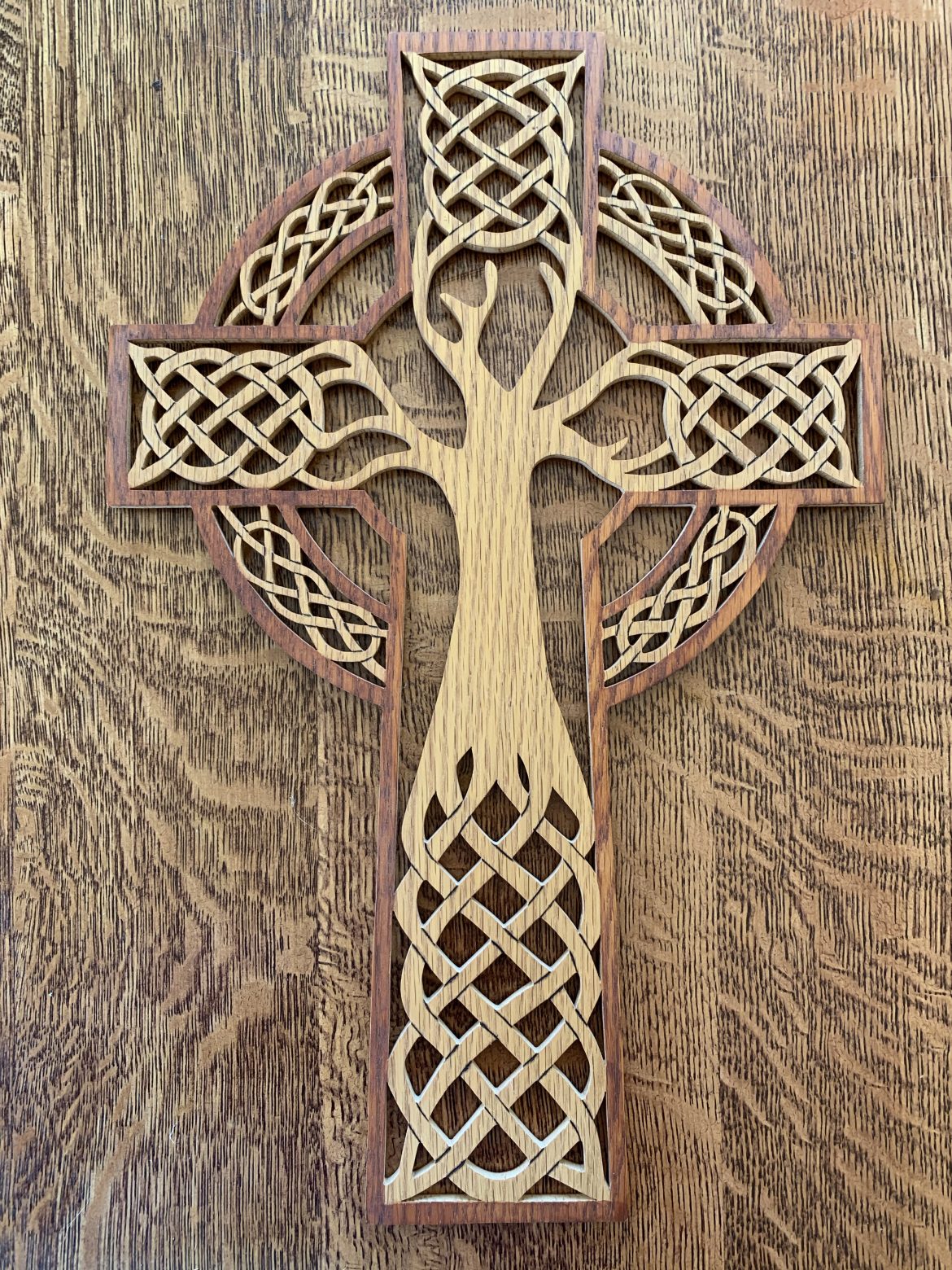The early medieval people of the British Isles were known for hospitality, of being willing to open their home where food, laughter, love, and life’s stories were shared. As people of faith, these Celts and early Anglo-Saxons of the 6th-10th centuries were following the New Testament commands of Jesus the Christ to show hospitality and loving care to the stranger. The writer of the book of Hebrews continued this teaching of extravagant welcome by reminding the readers that they may indeed be entertaining angels.
Jesus seemed to adore banquets, dinners, and parties so much that he not only attended them, but he also boldly invited himself to people’s homes. Jesus even described these parties in parables, often comparing them to the joyful kingdom of God where everyone is invited and welcomed to the Table. Yet, he found that he needed to get away by himself every now and then to recuperate from being both the giver and the recipient of hospitality.
 Interestingly, the very birth of Jesus called others to extend hospitality and welcome. From Mary’s “yes” to allowing her womb to be the first home of the Messiah; to Elizabeth welcoming this unwed pregnant relative into her home; to the Egyptians who welcomed this little refugee family; and even to the kingly welcome to planet earth from Magi from the East. Poignantly, we also see the pain of unwelcome when Joseph and the heavily pregnant Mary try to find a place to rest for the night after their long journey from Nazareth to Bethlehem. The innkeeper says there is no room in the inn, but rather sheepishly suggests that you may sleep in the barn with the animals. Yet, in the midst of that dirty and stinky stable something sacred is happening. A baby is being born to be King of the universe and the beasts who are sharing their home with this little family are being blessed to be the first to welcome the Messiah. These service animals are the first to see the newborn Jesus, to hear his first cries, and to sniff in in his newborn fresh from heaven scent.
Interestingly, the very birth of Jesus called others to extend hospitality and welcome. From Mary’s “yes” to allowing her womb to be the first home of the Messiah; to Elizabeth welcoming this unwed pregnant relative into her home; to the Egyptians who welcomed this little refugee family; and even to the kingly welcome to planet earth from Magi from the East. Poignantly, we also see the pain of unwelcome when Joseph and the heavily pregnant Mary try to find a place to rest for the night after their long journey from Nazareth to Bethlehem. The innkeeper says there is no room in the inn, but rather sheepishly suggests that you may sleep in the barn with the animals. Yet, in the midst of that dirty and stinky stable something sacred is happening. A baby is being born to be King of the universe and the beasts who are sharing their home with this little family are being blessed to be the first to welcome the Messiah. These service animals are the first to see the newborn Jesus, to hear his first cries, and to sniff in in his newborn fresh from heaven scent.
In this Biblical context, the Celtic Christians took to heart Jesus’s command to love our neighbor as ourselves, to welcome the stranger, and to party with the outcasts. One of the three much-loved patron saints of Ireland, the Abbess St. Bridget had a prayer of hospitality that seems a wee bit bawdy to us in the 21st century:
I’d like to give a lake of beer to God.
I’d love the Heavenly
Host to be tippling there
For all eternity.
I’d love the men of Heaven to live with me,
To dance and sing.
If they wanted, I’d put at their disposal
Vats of suffering.
White cups of love I’d give them,
With a heart and a half;
Sweet pitchers of mercy I’d offer
To every man.
I’d make Heaven a cheerful spot,
Because the happy heart is true.
I’d make the men contented for their own sake
I’d like Jesus to love me too.
I’d like the people of heaven to gather
From all the parishes around,
I’d give a special welcome to the women,
The three Marys of great renown.
I’d sit with the men, the women of God
There by the lake of beer
We’d be drinking good health forever
And every drop would be a prayer.
We cannot help but wonder how another great Abbess of the Celtic tradition, St. Hilda of Whitby, welcomed King Oswiu and his entourage along with other religious leaders arriving to her double monastery off the Northeast coast of England. These Northumbrian leaders were gathered in that seaside location in 664AD for the famous Synod of Whitby that dramatically changed the Celtic Christian world of faith. In spite of the honor of having this historic convocation at Whitby, did these guests disturb and disrupt the regular machinations of a monastery? How did Hilda with grace and kindness show hospitality to one of the participants, Wilfrid that she was not particularly fond of? How did she show extravagant welcome to those with whom she disagreed? How did Hilda incorporate the decisions that likely would not have pleased her?
Another story of Celtic hospitality tells of the Northumbrian King Oswin’s visit to St. Aidan at his newly established monastery on Lindisfarne. Aidan warmly welcomed the king, and the generous king gave peripatetic Aidan a very useful gift, a fine horse to help him over difficult terrain in his evangelistic work. Aidan then in turn gave the stallion away to a man who was begging for alms. When King Oswin heard of this, he was furious that Aidan had given his gift away to a beggar. Aidan replied: “Is the son of a mare more precious to the king than a son of God?”
The Celtic saints were known for showing hospitality not only to friends, family, and strangers, but also to animals. One of the much-loved Irish tales is of St. Kevin of Glendolough during his Lenten spiritual disciplines. While Kevin bowed and prayed with his arm leaning out of a window and his hand open and facing towards heaven, a blackbird landed on the palm of his hand. She made a nest there and laid her eggs. Kevin showing kindness, respect, and hospitality to this mother bird, kept his arm outstretched until those eggs hatched and those baby birds were able to leave the nest. It is even said that while St. Cuthbert of Lindisfarne was praying on the water’s edge, that two otters offered hospitality to him as they breathed on his feet to keep them warm and tried to dry off his feet with their fur.
Esther de Waal in her book, Every Earthly Blessing: Rediscovering the Celtic Tradition, states that Jonas, the biographer of St. Columbanus, described the saint’s walks through the hospitable forests. Columbanus would call out to the birds and animals to come visit with him. They would come running and scampering to him like, “like little puppies around their master.” It is even said that a squirrel would climb all over him and could occasionally be seen peeping through the folds of his monk’s robe. One of the most poignant stories of this saint deals with a hospitable bear that gave up his cave so that Columbanus could use it as his hermitage. The bear continued with his more than generous welcome by sharing his food with the saint.
As 21st century people of faith and also as spiritual descendants of the great Celtic saints, how may we show hospitality and welcome to each other and to nature? It can be risky to invite and welcome others to cross the well-guarded thresholds to our hearts, our minds, our homes, and our places of worship. It can seem especially disconcerting to warmly welcome those who are different than us; to those that we are not particularly fond of; or to those that seem scary or unappreciative. Yet, in Matthew’s gospel, Jesus said that when we have cared for and shown radical and extravagant hospitality to the least of the Lord’s brothers and sisters, we have done it to Him. May the earthy hospitality of the Celts so permeate our lives that we too become a welcoming glimpse of God’s love and grace wherever we are planted in life.
Rev. Brenda Warren is an ordained Christian Church (Disciples of Christ) minister. Her passion for the Celtic and early Anglo-Saxon saints has led her to research and write about them at www.saintsbridge.org. This Advent 2017, the “Celts to the Creche” online advent devotional will be expanded to a Celtic 40 days of Advent. Join us for this free online Advent devotional as we journey together to the Creche, where we experience Christ being born anew in our lives.

